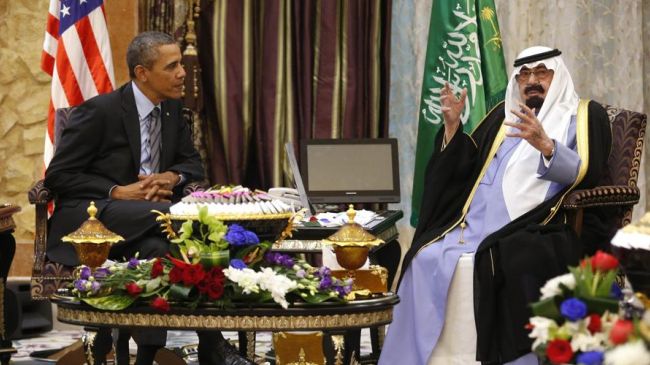Obama tiptoes around Saudi rights issue in talks with Abdullah: US official

US President Barack Obama has not raised the issue of Saudi Arabia’s human rights violations during a meeting with Saudi King Abdullah at a palace outside the capital Riyadh, a senior American official says.
“Today, given the extent of time they spent on Iran and Syria, they didn’t get to a number of issues, and it wasn’t just human rights,” the official said on Friday, speaking on condition of anonymity.
Earlier in the day, Amnesty International said in a statement that Obama must break silence on Saudi human rights record by adopting a firm public stand against the systematic violations in the Persian Gulf kingdom during his visit.
Obama was also urged by Amnesty to express regret at the restrictions on women’s driving in the country.
“It is crucial that President Obama sends a strong message to the government of Saudi Arabia that its gross human rights violations and systematic discrimination are unacceptable. A failure to do so would undermine the human rights principles the USA purports to stand for,” said Hassiba Hadj Sahraoui, the deputy director for the Middle East and North Africa at Amnesty International.
“For too long, the USA has shied away from publicly confronting Saudi Arabia over its human rights record, largely turning a blind eye to a mounting catalogue of abuses. This is an opportunity for the president to demonstrate that he will stop sacrificing respect for basic human rights, including equality and non-discrimination, for the sake of economic interests and political expedience,” Sahraoui added.
Saudi Arabia is the only country in the world that bans female drivers. Contrary to some news reports in the Western media, the ban has no Islamic basis and reflects radical interpretations of Saudi clerics that guide the US-backed kingdom.
Migrant workers and the kingdom’s Shia Muslims also face widespread and systematic discrimination.
Hundreds of thousands of workers have already left the kingdom amid tougher conditions for migrants.
Foreign workers cannot change jobs or leave Saudi Arabia without the permission of their sponsors, who are often Saudi companies or individuals who provide workers to businesses for profit.
Most of the sponsors take away the passports of the workers for the duration of their contract.
Human rights groups have criticized Saudi Arabia over the condition of migrant workers in the kingdom and called on Riyadh to abolish the sponsorship system for migrant workers.
There have been numerous demonstrations in Saudi Arabia’s Eastern Province, home to a large Shia population, since February 2011, with protesters calling for political reform.
Activists say there are over 40,000 political prisoners in Saudi Arabia, many of them being held without trial or charges.







